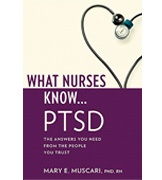 Close to 5.2 million adults experience post-traumatic stress disorder (PTSD) every year. And it can affect anyone — from war veterans and abuse victims to people directly or indirectly traumatized by violence, natural disaster or other catastrophes. In her latest book, What Nurses Know . . . PTSD, Binghamton researcher Mary Muscari provides a holistic view of this potentially debilitating illness, providing PTSD sufferers and their friends and relatives with a better understanding of the disorder and what to do about it.
Close to 5.2 million adults experience post-traumatic stress disorder (PTSD) every year. And it can affect anyone — from war veterans and abuse victims to people directly or indirectly traumatized by violence, natural disaster or other catastrophes. In her latest book, What Nurses Know . . . PTSD, Binghamton researcher Mary Muscari provides a holistic view of this potentially debilitating illness, providing PTSD sufferers and their friends and relatives with a better understanding of the disorder and what to do about it.
“Dealing with PTSD is like riding a rollercoaster, ” said Muscari, an associate professor in the Decker School of Nursing at Binghamton University. “The swing of emotions can have a huge impact on relationships, work environment and social activities. And in addition to disrupting the lives of the victims, PTSD often has a ripple effect, throwing relationships with family members, friends and colleagues into complete turmoil. But help is out there, and this book offers individuals with PTSD and their families the tools to recognize the problem and know how and where to get assistance.”
 Muscari said the key is to get treatment as soon as possible after PTSD symptoms develop so that it doesn’t become a long-term condition.
Muscari said the key is to get treatment as soon as possible after PTSD symptoms develop so that it doesn’t become a long-term condition.
“Treatments for PTSD can involve psychotherapy or medications, or a combination of both,” Muscari said. “It’s all about support, dialogue and education. But because everyone is different, there is no substitute for treatment provided by a mental health professional experienced in treating PTSD — someone who is trained to figure out what’s going to work best. And while my book cannot replace therapy, it can be a valuable resource for sufferers and family.”
In addition to covering current treatment options, What Nurses Know….PTSD goes to the root of the condition, examining the causes and the disorder’s impact on victims and their families. It also looks at associated problems such as substance abuse and offers tips for managing stress. For instance, Muscari urges PTSD sufferers to use time-management techniques such as learning how to say “no” and delegation as ways to manage everyday stresses.
Muscari also examines PTSD in children and adolescents, focusing on what makes this disorder so challenging in young sufferers. “Kids with PTSD may experience many of the same symptoms as adults,” Muscari said. “But they often have greater difficulty talking about their thoughts and feelings. Children and teens also tend to have different types of recollection experiences than adults. We’re talking frightening dreams and even behavioral problems. If not treated properly, a child’s sense of security can be severely impacted, which in turn influences brain function and development.”
Muscari said the goal of What Nurses Know….PTSD is to show victims and their friends and families that they are not alone in their struggle.
“PTSD sufferers have a real illness, one that is as real as high blood pressure or diabetes,” Muscari said. “But it can also be seen as merely a barrier in our life’s journey.”








Sounds like a great book. Who is the publisher and where can we get a copy?
The book is published by Demos Health, an imprint of Demos Medical Publishing. The book is available from the publisher (http://www.demoshealth.com/prod.aspx?prod_id=9781936303069) as well as from Amazon (http://www.amazon.com/What-Nurses-Know-PTSD/dp/193630306X) and other booksellers.
Bravo our Veterans!
Current drug pharmaceutical PTSD treatment for Veterans found ineffective.
Eli Lilly made $70 billion on the Zyprexa franchise.Lilly was fined $1.4 billion for Zyprexa fraud!
The atypical antipsychotics (Zyprexa,Risperdal,Seroquel) are like a ‘synthetic’ Thorazine,only they cost ten times more than the old fashioned typical antipsychotics.
These newer generation drugs still pack their list of side effects like diabetes for the user.All these drugs work as so called ‘major tranquilizers’.This can be a contradiction with PTSD suffers as we are hyper vigilant and feel uncomfortable with a drug that puts you to sleep and makes you sluggish.
That’s why drugs like Zyprexa don’t work for PTSD survivors like myself.
— Daniel Haszard